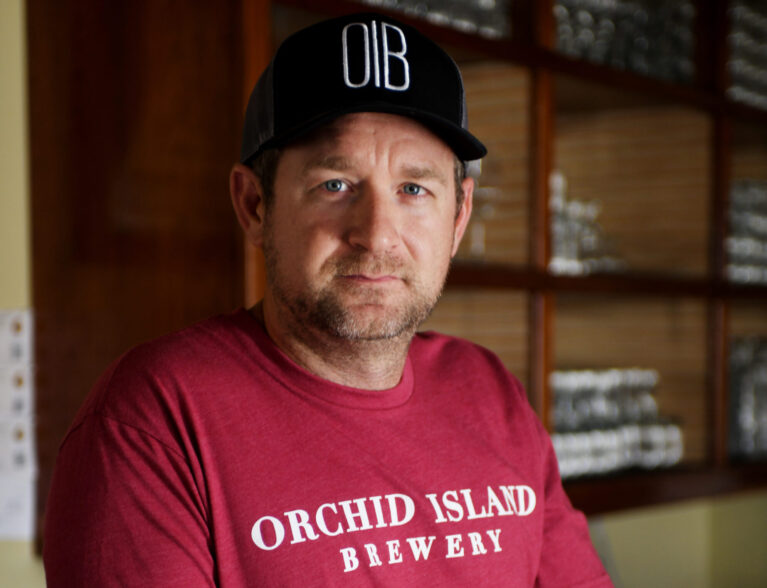
Since the day he and his wife opened Orchid Island Brewery in August 2014, Alden Bing waited for someone else to speak out against what he sees as the unfairness of the Florida laws regulating the state’s beer industry – specifically, the three-tier system that prohibits self-distribution.
“I knew the flaws in the law when I went into this,” Bing said, “and I kept hoping someone would take the lead.”
Now, he’s taking up the cause and asking for public support to push state legislators to rewrite an “antiquated” statute that dates to the repeal of Prohibition. He called the current regulations “un-American” and compared the system to a “shakedown” that requires “mafia-type payoffs.”
Specifically, Bing wants to see Florida’s Beer Franchise Law amended to give smaller breweries the freedom to enter and exit contracts with distributors and allow breweries to self-distribute their products on a limited basis.
“I don’t want to drive down to Key West to sell our beer, but I should be allowed to take it across the street and sell it to the Citrus Grillhouse,” Bing said. “I should be allowed to self-distribute our beer in our backyard, in Indian River County.”
But it’s illegal for him to do so.
Under the state’s three-tier system, breweries may sell only to beverage distributors, who sell to the vendors. The brewery may not deal directly with the vendor.
Florida is one of only 15 states that do not allow breweries to distribute their own beer, instead requiring breweries to sign contracts with distributors to have their products shipped to bars, restaurants, supermarkets and other retail outlets.
Bing’s said he sells his beer at a 30-percent discount to the West Palm Beach-based Brown Distributing Company, which then sells his product to vendors from Indian River County to the Florida Keys.
While the franchise law prevents brewers from exiting their contracts, distributors may end them – or sell them to another distributor – at any time.
“I have to pay to have my product distributed, even locally, even though I created the demand,” Bing said. “And if I offend Brown, they can put a choke hold on my brand by saying, ‘The customers aren’t asking for it,’ and push Anheuser-Busch products instead.”
Bing was quick to add, however, that he values his relationship with Brown and merely is seeking the “option to sell my own beer on a limited basis, which is allowed in 35 other states that recognized the three-tier system wasn’t fair.”
One of those states is North Carolina, where smaller breweries may self-distribute up to 25,000 barrels of their products per year. Asheville, for example, has a thriving craft-beer industry.
Bing was especially critical of Florida lawmakers who say they welcome new business and support free-market capitalism but refuse to address a flawed law that continues to hinder the success of small, independent breweries.
He said lawmakers are reluctant to act because large brewers – Anheuser-Busch, now based in Belgium, dominates the Florida market – and distributors wield influence through political campaign contributions.
“The existing law is ambiguous by design,” Bing said. “The more confusing you can make it, the less chance it’ll be changed. That’s why I’m taking the case to the people, asking them to join the fight for fairness by contacting their state legislators.”
He said he has discussed the issue with State Rep. Erin Grall and State Sen. Debbie Mayfield, urging them to sponsor a bill in the next session of the Florida Legislature, but both told him it would be difficult to get the support necessary to change the law.
Neither Grall nor Mayfield could be reached for comment.
“The other way to change the law, at least temporarily, would be through the governor issuing an executive order,” Bing said, “but I’ve seen no indication that will happen any time soon.”
Bing downplayed a visit to Vero Beach last month by Florida Department of Business and Professional Regulation Secretary Halsey Beshears to discuss ways for Treasure Coast bars and breweries to reopen amid the COVID-19 pandemic.
He said Beshears’ visit was “all about optics” and “making it look like they’re interested in helping, but the secretary was merely paying “lip service” to the plight of the small breweries.
The only ray of hope, Bing said, was Beshears’ willingness to consider easing restrictions to allow small breweries to offer home-delivery of their beers – a practice that the law currently prohibits.
“I’m pressing Halsey to do this, and he seems somewhat receptive,” Bing said, “but he didn’t give me a time frame.”
Orchid Island Brewery, one of the county’s first microbreweries, was a popular gathering place for island residents until Bing announced last month the permanent closure of its Portales de Vero taproom, which has been shut down since March 17.
Bing said the decision to close the taproom was accelerated by the pandemic, but he already had purchased a canning line and continues to operate as a package store on the same site, selling products by appointment.
He expects to remain in business long enough to see the law changed.
“We were able to pivot and completely shift our revenue stream from across-the-bar sales to a package-store model, which enables us to survive,” Bing said. “We built up enough brand awareness to sustain us, especially since we no longer have the overhead of operating a bar.
“So, we’re still making beer,” he added. “People are coming to the brewery to buy four-can packs and taking them home. And we’re eager to get into consumer-direct sales.
“That’s the future.”







Comments